Deep Dive into How El Salvador is Moving Towards Sovereignty and Prosperity
Written by: Efrat Fenigson
Translated by: AididiaoJP, Foresight News
In the past week, I visited El Salvador for the third time in a year, and it is evident that the country is undergoing a genuine transformation—not just theoretical talk or superficial changes, but a fundamental shift in how people live, think, build, and envision the future. The moment that encapsulated all of this occurred during a private dinner with President Nayib Bukele, which I was fortunate to attend over the weekend.
I have been following his work for several years. In my podcast, I interviewed nine Salvadorans and expatriates living locally, as well as businessmen, builders, community organizers, and ordinary citizens. A year ago, I tweeted that my dream was to meet him one day.
What I didn’t expect was that at the end of the dinner, when I approached him for a photo and said, "Hello, I’m Efrat," before I could introduce myself, he immediately responded:
"I know you, I’ve seen your podcast."
That moment was unforgettable, as it made me feel that all the experiences of the week were closely connected to the grand narrative unfolding in this country.
The Triple Landscape of the Nation
During this week, three events took place: "Regaining Health," "Adopting Bitcoin," and "Historic Bitcoin," each revealing different aspects of El Salvador's developmental trajectory.
The "Regaining Health Workshop," led by Salvadoran doctor Kenneth Fernandez-Taylor, explored the intersection of physical health and sound currency. Some discussions focused on how unsound currency and long working hours shape people's stress, uncertainty, and long-term health. In a country that has already regained public safety and is working towards economic freedom, the connection between health and money feels so intuitive, not abstract at all. Four years ago, when the world was gradually descending into madness during the "apocalyptic pandemic," such a gathering of truth-seeking, freedom-loving doctors, healers, and experts seemed like an unattainable dream. But in El Salvador, dreams are becoming reality.
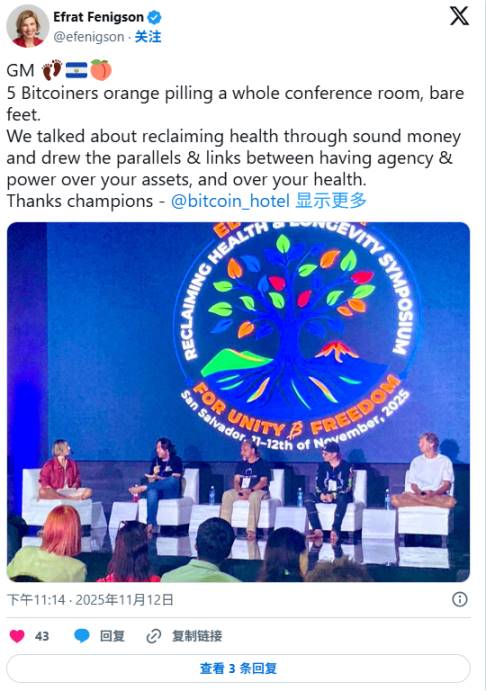
At the "Adopting Bitcoin" conference, I witnessed the foundational engine of this transformation. Circular economies like El Salvador's "Bitcoin Beach" (El Zonte), "Berlin," and "MurphLife" vividly demonstrate what happens when people earn, spend, and save in "satoshis." Communities like "Bitcoin Babies," "Orange Women," or Argentina's "La Crypta" emphasize that Bitcoin belongs to everyone. Merchants naturally accept Bitcoin. Children grow up in its atmosphere. "My First Bitcoin" announced its new chapter: providing educational materials, frameworks, and guidance for over 70 projects across more than 40 countries, supporting community-led Bitcoin education. The startup exhibition was filled with founders who have established offices and started businesses in El Salvador. I repeatedly heard a common theme, very simple: here, you can get things done.

Image: Michael Holomon Jr.
https://x.com/unkle_skunkle/status/1989823319093240030/photo/1
Bitcoin and El Salvador's Historic Moment
But the climax of the week, the moment that set the tone for everything, was the "Historic Bitcoin" conference. This was the world's first government-led Bitcoin conference, organized by the Bitcoin Office established by the Salvadoran government (led by Stacey Herbert and her team) and held at the National Palace and the National Theater. These two locations are highly symbolic landmarks, and choosing to host the Bitcoin conference in such solemn places speaks volumes beyond words. The hall gathered ministers, entrepreneurs, and international speakers; voices from the United States, Europe, Latin America, and Africa. Guests received a booklet titled "El Salvador, the Bitcoin Nation," featuring a photo of President Bukele on the cover, clearly indicating that Bitcoin is a national strategy here.
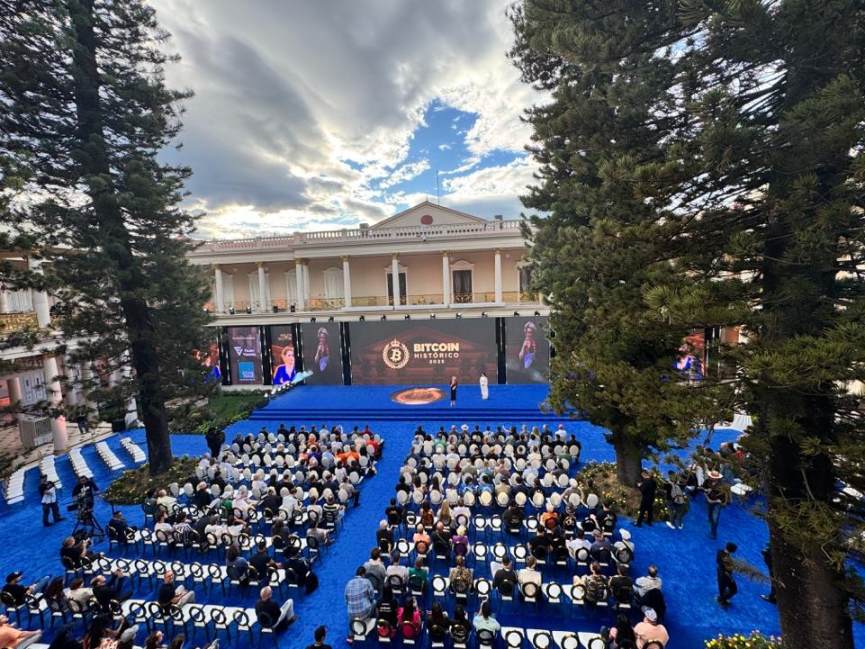
Photo: Efrat Fenigson
Outside in Gerardo Barrios Square, the conference extended into public space; the content was translated into Spanish and broadcast live to local families, students, and elders. Shops and stalls accepted "satoshis" as payment, and Bitcoin seemed to return to its natural habitat, integrating into the city's daily life, with the public becoming part of the conference.
Multiple announcements highlighted the nation's forward direction: the Ministry of Agriculture signed a cooperation agreement with "The Beef Initiative" to strengthen local beef production. Steak 'n Shake announced that El Salvador would be its first stop in Latin America and would accept Bitcoin from day one of its opening.
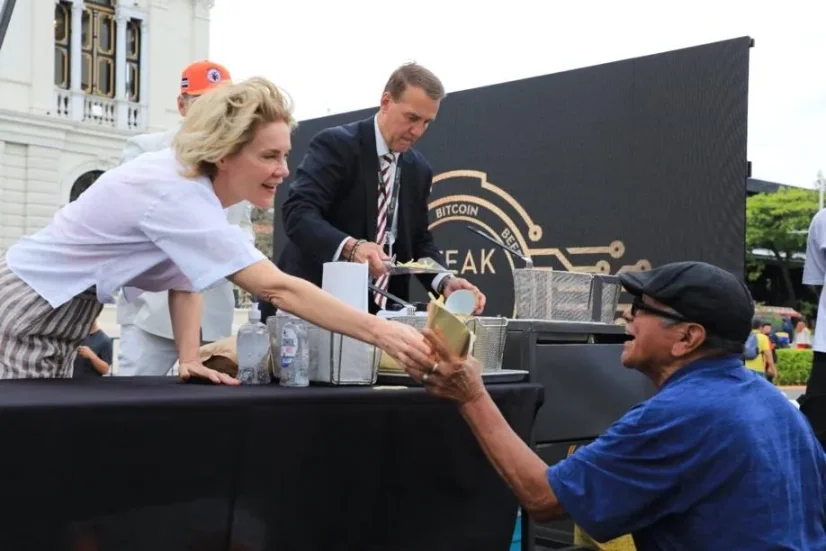
Image Source: Translating El Salvador
https://x.com/TranslatingES/status/1989744516228673658/photo/4
The government announced plans to procure Nvidia B300 chips, which, with the support of Hydra Host, have the computational power to train and run advanced AI models locally. This is a step towards sovereign computing infrastructure, reducing dependence on large tech companies' data centers and laying the groundwork for El Salvador to build its own AI capabilities domestically. Mempool, after securing a recent $17 million investment, announced it would register in El Salvador. With the support of Lina Seche and the Bitcoin Office, as part of the "Two Schools a Day" program aimed at the country's large-scale modernization and expansion of educational infrastructure, 500 classrooms will be renovated for Bitcoin and financial education. These initiatives collectively outline a coherent picture: a nation building its future on multiple levels simultaneously.
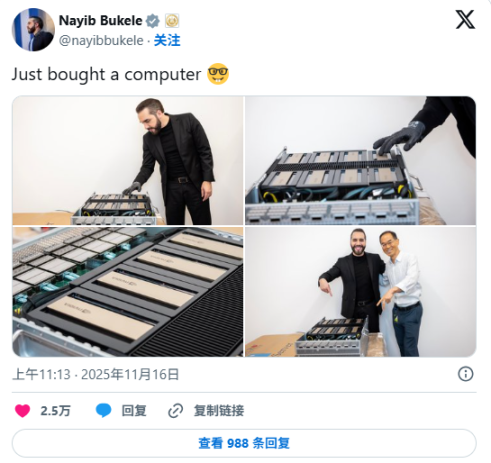
Ricardo Salinas's presence added a highlight to the "Historic Bitcoin" conference. In his speech, he stated, "El Salvador is on the right side of history," and specifically pointed out the significant improvement in public safety: "(It is) safer than Japan. I really wish my country could be like this." This influential Latin American entrepreneur articulated a common sentiment shared by many visitors this week.

Image: Efrat Fenigson
Presidential Dinner
However, the clearest window into that future was at the dinner.
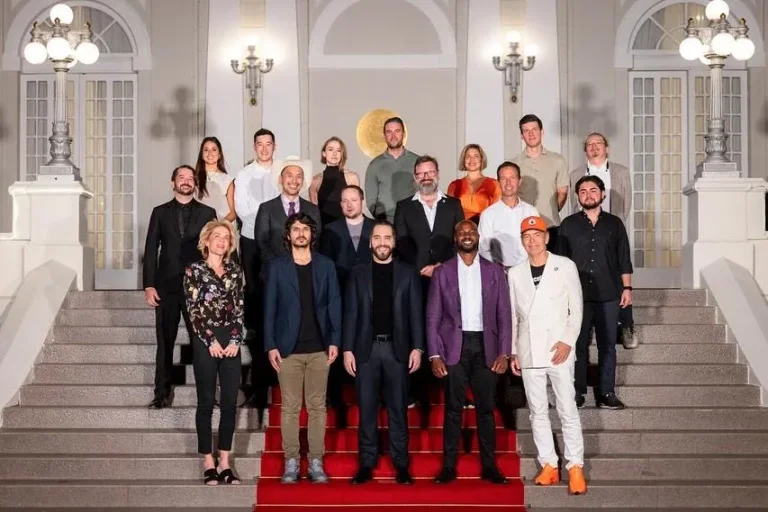
Image: El Salvador Bitcoin Office
Bukele is entirely different from his international cartoonish image. He is sharp-minded, quick-witted, humorous, and well-versed in Bitcoin culture. As soon as he sat down, he joked, "Guys, it's over, Bitcoin is done," just because the price had dropped below $100,000 that day. He is not the type of politician who deliberately tries to appear down-to-earth or reads from a script; he genuinely understands the subject and truly comprehends Bitcoin.
When the topic turned to Bitcoin's long-term trajectory, he said something that stuck with me: "Bitcoin should be a currency."
Not an investment, not an asset class, but a currency. He clearly sees the ultimate state and understands the path to get there. The communities that use Bitcoin daily are the backbone of transforming it from an idea into a functional currency system.
His sharp wit complements his analytical insights. When Giacomo Zucco, director of Plan B Network, was introduced as an "anarcho-capitalist," Bukele immediately responded, "That's okay, I’m friends with Milei too," and throughout the dinner, he humorously referred to him as "that anarchist." After Wiz gifted him a samurai sword and Giacomo presented a bottle of rum named "Dictator" (lightly poking fun at the media narrative), someone reminded that Bukele doesn’t drink. He immediately replied, "That's okay, I don’t often sword dance either."
At the end of the dinner, Giacomo thanked him, and Bukele smiled as he summarized his governing philosophy: "I’m sorry I’m running a government, but it’s a very small government."
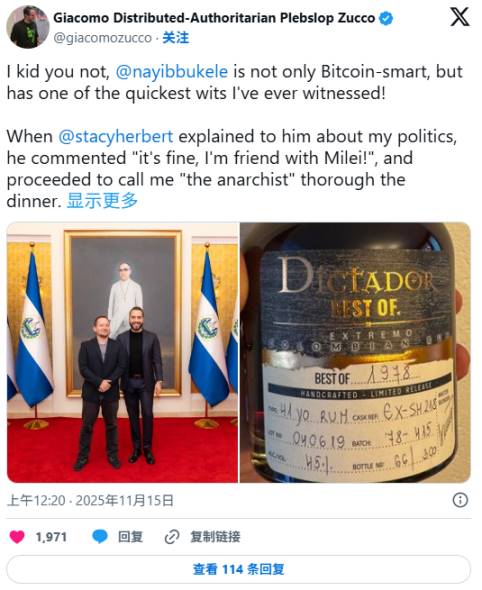
The Happy Whistler
I have visited many countries that are sliding into darker trajectories: more surveillance, greater centralization, tighter control, and more violence. Yet everything happening in El Salvador is the exact opposite: safe and unoppressive, structured yet not suffocating, free and responsible. After enduring decades of violence from gangs, Salvadorans feel liberated. You can see it on their faces: they are friendly, relaxed, and full of gratitude. On my last trip, I met a 75-year-old man cycling through El Zonte at sunrise, whistling. "When do people whistle?" I asked myself. "Happy people whistle. People only whistle when they feel safe." That simple moment became a silent metaphor for my feelings about this place.
Yes, this country still needs to deal with global institutions like the International Monetary Fund. The recent decision to abolish Bitcoin's legal tender status is indeed regrettable, but after glimpsing the substance beneath the surface, it feels like taking one step back and four steps forward. Progress is certainly not linear. But the direction is undeniable: moving towards monetary sovereignty, digital sovereignty, educational sovereignty, and popular sovereignty, with all forces pushing in the same direction.
This week allowed me to glimpse a nation that is reshaping itself.
While most countries in the world struggle with economic, security, and fragile social structures under the influence of the global agenda, El Salvador is changing its reality and stepping into a new timeline.
Meeting Bukele felt less like meeting a president.
It felt more like meeting an architect determined to liberate his country and pave the way for it.
免责声明:本文章仅代表作者个人观点,不代表本平台的立场和观点。本文章仅供信息分享,不构成对任何人的任何投资建议。用户与作者之间的任何争议,与本平台无关。如网页中刊载的文章或图片涉及侵权,请提供相关的权利证明和身份证明发送邮件到support@aicoin.com,本平台相关工作人员将会进行核查。




